NIL Sunshine
 By: Robert Craft
By: Robert Craft
TheSouthernSportsEdition.com news services
NIL is coming to the Sunshine State for high school athletes.
The Florida High School Athletic Association Board of Directors passed sweeping bylaw changes earlier in the month to allow name, image and likeness activities for its student-athletes without forfeiting the ability to play high school sports.
The new policy passed unanimously after about 45 minutes of additional debate, including an argument from a coach in opposition of the new bylaw. The measure takes effect in time for the 2024-25 high school season.
With the change, 36 local athletic associations now allow student-athletes to participate in NIL deals on the high school level. The South Dakota High School Activities Association could become the 37th to permit NIL activities for high school players when the results of a membership vote become public in the coming days.
There’s been a significant shift over the past year in how high school administrators view NIL and it’s now acceptable in a majority of states from coast-to-coast. Florida is now officially part of the change.
The Sunshine State is a perennial producer of top high school athletes across multiple sports markets. Florida’s 2025 class has four five-star prospects in football alone – including the nation’s No. 1 linebacker in Solomon Thomas – and there are 56 players ranked four stars or higher. Florida’s 2025 class in basketball features two five-stars, including Five-Star Plus+ standout Cameron Boozer.
Plus, Florida is home to top high school athletes in women’s sports. The state is a haven for standouts in non-revenue sports, such as golf, soccer and lacrosse. The changes mean recruits in Florida and high school athletes in Florida can participate in NIL brand deals without fear of missing playing time.
In many ways, the new Florida High School Athletic Association NIL bylaw mirrors what is now acceptable for other high schoolers nationwide.
The new bylaws state that student-athletes and their parents/guardians must negotiate any NIL activities independent of their school, school district or the FHSAA.
Student-athletes will be prohibited from monetizing their NIL with the use of their school’s uniform, equipment, logo, name, proprietary patents, products and/or copyrights associated with an FHSAA member school and/or school district, either in public, print or social media platforms. Student-athletes are also encouraged to seek legal counsel and tax advice when considering NIL activities.
Interestingly, the FHSAA does include a line in its new bylaws that says a student-athlete could impact their amateur status by hiring a registered agent to manage his/her athletic career – other than for the purpose of advising on NIL-related matters.
The new rules aim to protect against recruiting. High-school-oriented collectives are focused on retaining talent locally at the high school level. This was of significant concern for high school coaches and athletic directors in Florida leading up to the change.
Florida is one of the most progressive states when it comes to NIL at the collegiate level. On July 1, 2001, college athletes in Florida became eligible to profit off their name, image and likeness under a bill signed into law by Gov. Ron DeSantis.
But up until recently, there has been some pushback from administrators and coaches about allowing it at the high school level.
Others have realized the threat of losing talent to other states (ones where NIL is allowed) as the biggest reason Florida is now allowing it.



